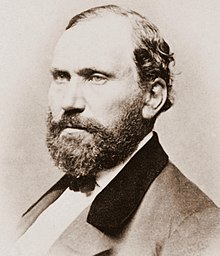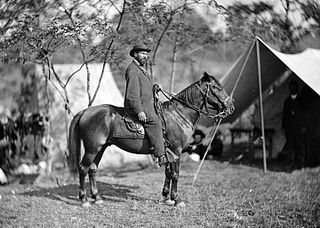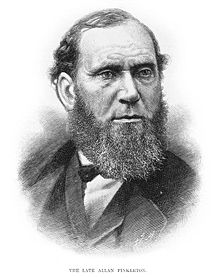Allan Pinkerton
Allan Pinkerton | |
|---|---|
 c.1861 | |
| Born | August 21, 1819[1][2] Glasgow, Scotland |
| Died | July 1, 1884 (aged 64) Chicago, Illinois, U.S. |
| Resting place | Graceland Cemetery, Chicago, U.S. |
| Occupation(s) | Cooper, abolitionist, detective, spy |
| Spouse |
Joan Carfrae
(m. 1842) |
| Children | 3 |
Allan Pinkerton (August 21, 1819
Early life
Allan Pinkerton was born in the Gorbals, a working-class area of Glasgow, on August 21, 1819, the second surviving son[2] of William Pinkerton and Isobel McQueen;[4] he was baptized on August 25, 1819, which many sources incorrectly give as his birthdate.[2] He left school at the age of 10 after his father's death. Pinkerton read voraciously and was largely self-educated.[5] A cooper by trade,[6] he was active in the Scottish Chartist movement as a young man.[7] He was not raised in a religious upbringing, and was a lifelong atheist.[8]
Pinkerton emigrated to the United States in 1842. In 1843, he heard of Dundee Township, Illinois, fifty miles northwest of Chicago on the Fox River.[9] He built a cabin and started a cooperage, sending for his wife in Chicago when their cabin was complete.[9] As early as 1844, Pinkerton worked for the Chicago abolitionist leaders, and his Dundee home was a stop on the Underground Railroad.[10]
Detective
Pinkerton first became interested in criminal detective work while wandering through the wooded groves around Dundee, looking for trees to make

In 1859, he attended the secret meetings held by John Brown and Frederick Douglass in Chicago along with abolitionists John Jones and Henry O. Wagoner. At those meetings, Jones, Wagoner, and Pinkerton helped purchase clothes and supplies for Brown. Jones' wife, Mary, guessed that the supplies included the suit Brown was hanged in after the failure of John Brown's raid on Harpers Ferry in November 1859.[12]
American Civil War
When the
Military historians have been strongly critical of the intelligence Pinkerton provided for the Union Army, which for the most part was undigested raw data.
On the other hand, Edwin C. Fishel in The Secret War for the Union and James Mackay in Allan Pinkerton: The First Private Eye argue that the troop strength figures which Pinkerton passed on to McClellan were relatively accurate, and that McClellan himself held primary responsibility for inflating those numbers to wildly unrealistic levels.[18][19]

After the war
Following Pinkerton's services for the
Personal life
Pinkerton married Joan Carfrae (1822–1887), a singer from Duddingston, in Glasgow on March 13, 1842.[22] They remained married until his death.
Death
Pinkerton died in

Pinkerton is buried between his wife and Kate Warne in the family plot in Graceland Cemetery, Chicago.[25] He is a member of the Military Intelligence Hall of Fame.[26]
Legacy
After his death, the agency continued to operate and soon became a major force against the
- The Anti-Pinkerton Actof 1893, prohibiting the federal government from hiring its detectives
- The Pullman Strike (1894)
- The Wild Bunch Gang (1896)
- The Ludlow Massacre (1914)
- The La Follette Committee (1933–1937)
Despite his agency's later reputation for anti-labor activities, Pinkerton himself was heavily involved in pro-labor politics as a young man.[27] Though Pinkerton considered himself pro-labor, he opposed strikes[28] and distrusted labor unions.[29]
Allan Pinkerton was so famous that for decades after his death, his surname was a slang term for a private eye, whether they were agents of the Pinkerton Agency or not. The "Mr. Pinkerton" novels, by American mystery writer Zenith Jones Brown (under the pseudonym David Frome), were about Welsh-born amateur detective Evan Pinkerton and may have been inspired by the slang term.
Writings
Pinkerton produced numerous popular detective books, ostensibly based on his own exploits and those of his agents. Some were published after his death, and they are considered to have been more motivated by a desire to promote his detective agency than a literary endeavour. Most historians believe that Allan Pinkerton hired ghostwriters, but the books nonetheless bear his name and no doubt reflect his views.[30]
- —; William Henry Herndon; Jesse William Weik (1866). Allan Pinkerton's Unpublished Story of the First Attempt on the Life Of Abraham Lincoln. Phillips Publishing Co.
- —; William Henry Herndon; Jesse William Weik (1868). History and Evidence of the Passage of Abraham Lincoln from Harrisburg, Pa., to Washington, D.C. on the 22d and 23d of February, 1861. Phillips Publishing Co.
- — (1874). The Expressman and the Detective. Chicago: W. B. Keen, Cooke & Co.
- — (1875). Claude Melnotte As A Detective, And Other Stories. Chicago: W. B. Keen, Cooke & Co. Retrieved July 8, 2009.
- — (1875). The Somnambulist and the Detective, The Murderer and the Fortune Teller. New York: G. W. Dillingham Co. Retrieved July 8, 2009.
- — (1876). The Spiritualists and the Detectives. New York: G. W. Dillingham Co. Retrieved July 8, 2009.
- — (1877). The Molly Maguires and the Detectives, 1905 ed. New York: G. W. Dillingham Co. Retrieved July 8, 2009.
- — (1878). Strikers, Communists, Tramps and Detectives. New York: G. W. Dillingham Co. Retrieved July 8, 2009.
- — (1878). Criminal Reminiscences and Detective Sketches. New York: G. W. Dillingham Co. Retrieved July 8, 2009.
- — (1879). Mississippi Outlaws and the Detectives, Don Pedro and the Detectives, Poisoner and the Detectives. New York: G. W. Dillingham Co. Retrieved July 8, 2009.
- — (1879). The Gypsies and the Detectives. New York: G. W. Dillingham Co. Retrieved July 8, 2009.
- — (1880). Bucholz and the Detectives. New York: G. W. Dillingham Co. Retrieved July 8, 2009. Also available via Project Gutenberg
- — (1881). The Rail-Road Forger and the Detectives. New York: G. W. Dillingham Co. Retrieved July 8, 2009.
- — (1883). The Spy of the Rebellion: Being a True History of the Spy System of the United States Army During the Late Rebellion. Hartford, Conn.: M. A. Winter & Hatch. Retrieved July 8, 2009.
- — (1884). A Double Life and the Detectives. New York: G. W. Dillingham Co. Retrieved July 8, 2009.
- — (1886). Professional Thieves and the Detective: Containing Numerous Detective Sketches Collected From Private Records. New York: G. W. Dillingham Co. Retrieved July 8, 2009.
- — (1886). A Life for a Life: Or, The Detective's Triumph. Laird & Lee.
- — (1892). Cornered at Last: A Detective Story.
- — (1900). Thirty Years a Detective: A Thorough and Comprehensive Expose of Criminal Practices of all Grades and Classes. New York: G. W. Dillingham Co. Retrieved July 8, 2009.
- — (1900). The Model Town and the Detectives, Byron as a Detective. New York: G. W. Dillingham Co. Retrieved July 8, 2009.
In popular culture
- In the 1951 feature film The Tall Target, a historical drama loosely based on the Baltimore Plot, Allan Pinkerton is portrayed by Scottish actor Robert Malcolm. The M-G-M production stars Dick Powell and was directed by Anthony Mann.
- In the 1956 episode "The Pinkertons" of the television series, The Life and Legend of Wyatt Earp, set in Wichita, Kansas, Douglas Evans portrays Allan Pinkerton, who is seeking to recover $40,000 in stolen money but interferes with the attempt of Marshal Wyatt Earp (Hugh O'Brian) to catch the entire gang of Crummy Newton (Richard Alexander).
- In the 1969 Spaghetti Western The Price of Power, Pinkerton appears as an associate of President James A. Garfield who takes part in his (highly fictionalized) assassination. He is portrayed by Spanish actor Fernando Rey.
- Pinkerton is portrayed in an episode of The Life and Times of Grizzly Adams (1974) by Don Galloway.
- In 1990, Turner Network Television aired the 1990 speculative historical drama The Rose and the Jackal, with Christopher Reeve as Pinkerton, recounting his (completely fictional) romance with the Confederate spy Rose O'Neal Greenhow.
- In 1994, "Pinkertonova detektivní agentura" ('Pinkerton's Detective Agency") [31] an episode of the Czech TV series Dobrodružství kriminalistiky ("The Adventure of Criminology") was aired.
- Pinkerton is portrayed in the 1994 American biographical western film Frank and Jesse by William Atherton
- Pinkerton is a major character portrayed by Timothy Dalton in the 2001 film American Outlaws.
- Pinkerton's role in foiling the assassination plot against Abraham Lincoln was dramatized in the 2013 film Saving Lincoln, which tells President Lincoln's story through the eyes of Ward Hill Lamon, a former law partner of Lincoln who served as his primary bodyguard during the Civil War. Pinkerton is played by Marcus J. Freed.
- Charlie Day portrayed Pinkerton in "Baltimore", a Season 2 episode of the docudrama TV series Drunk History, first broadcast on July 22, 2014.
- Pinkerton is a recurring character played by Angus Macfadyen in the 2014 TV series The Pinkertons.
- Pinkerton is an important character in Steven Price's 2016 novel By Gaslight.
- The Pinkerton Detective Agency plays a large role in the plot of the 2018 western video game Red Dead Redemption 2.
- "The Pinkerton Agency" is a podcast episode of the Dollop in 2024.
See also
References
Informational notes
- ^ McClellan was so committed to believing Pinkerton's numbers, that even years later, at a time when those numbers were well known to have been widely inaccurate, he used them in writing his memoirs. McClellan had employed Pinkerton as a detective when he was an executive of the Illinois Central railroad, and his service to McClellan during the war was as a civilian employee working from the provost marshall's office, not as a member of the Union Army. To some extent, McClellan himself was responsible for the exaggerated numbers, as he had instructed Pinkerton to overestimate in order to account for troops not yet found. Pinkerton's sycophancy undoubtedly also contributed, as he provided for his boss the kind of numbers that it was obvious McClellan expected to receive. See Murfin (2004) [1965], Sears (1988) and Sears (2017), p.84
Citations
- ^ "1819 PINKERTON, ALLAN (Old Parish Registers Births 644/ 2 Gorbals) Page 107 of 113". Scotland's People. National Records of Scotland and the Court of the Lord Lyon.
- ^ a b c d Mackay (1997), p.20; August 25 was the date of his baptism, which many sources incorrectly give as his birthdate.
- ^ a b Sears (2017), p.104
- ^ The Editors of Encyclopaedia Britannica (July 20, 1998). "Allan Pinkerton". Encyclopædia Britannica. Encyclopædia Britannica, Inc. Retrieved November 28, 2021.
- .
- ^ Seiple (2015), pp. 10–11
- ^ Seiple (2015), pp. 11–13
- doi:10.1093/ref:odnb/49497. Retrieved May 2, 2008.required.)
Although christened by a Baptist minister in the Gorbals (August 25, 1819), he had a churchless upbringing and was a lifelong atheist
(Subscription or UK public library membership - ^ a b Horan (1969), p.13
- ^ Horan (1969), p.19
- ^ Seiple (2015), pp. 16–17
- ^ Junger, Richard (2009) "Thinking Men and Women who Desire to Improve our Condition: Henry O. Wagoner, Civil Rights, and Black Economic Opportunity in Frontier Chicago and Denver, 1846–1887" in Alexander, William H.; Newby-Alexander, Cassandra L.; and Ford, Charles H. eds Voices from within the Veil: African Americans and the Experience of Democracy. Cambridge Scholars Publishing, p.154
- ^ Stockham, Braden (2017). "Chapter 2: Literature Review: Historical Background". The Expanded Application of Forensic Science and Law Enforcement Methodologies in Army Counterintelligence (Thesis). Fort Belvoir, Virginia: Defense Technical Information Center. p. 6.
- ISBN 978-0195065480.
- ISBN 978-0-517-16237-8
- ISBN 978-03068091-32
- ISBN 978-0-8071-3020-9
- ISBN 0-395-90136-7
- ^ Mackay (1997), pp.8-9
- ISBN 9780375705588.
- Journal of American Historyv.85, n.3, pp.1106–1107
- ^ ScotlandsPeople OPR Banns & Marriages Record 644/001 0420 0539
- ISBN 9781567206739.
- ^ Lanis, Edward Stanley (1949) Allan Pinkerton and the Private Detective Institution (M.S. Thesis). p. 170, University of Wisconsin, Madison.
- ISBN 9781493026401.
- ISBN 9781467120418.
- ^ "Allan J. Pinkerton". Thrillingdetective.com. Retrieved December 28, 2011.
- ISBN 9780534645571. Retrieved December 28, 2011 – via Google Books.
- ^ "Detective Allan Pinkerton Was Born in Glasgow, Scotland". Americaslibrary.gov. Retrieved December 28, 2011.
- ^ Mackay (1997), pp.208-209
- ^ Pinkertonova detektivní agentura (Television production) (in Czech). Retrieved November 28, 2021.
Bibliography
- Horan, James D. (1969) [1967]. The Pinkertons: The Detective Dynasty That Made History. New York: Crown Publishers.
- Mackay, James (1997) Allan Pinkerton: The First Private Eye. New York: Wiley. ISBN 978-0471194156
- ISBN 978-1-328-91579-5
- Seiple, Samantha (2015). Lincoln's Spymaster: Allan Pinkerton, America's First Private Eye. New York: ISBN 978-0-545-70897-5.
Further reading
- Josephson, Judith Pinkerton (1996) Allan Pinkerton: The Original Private Eye Minneapolis, Minnesota: Lerner. ISBN 9780822549239
External links
- Works by Allan Pinkerton at Project Gutenberg
- Works by or about Allan Pinkerton at Internet Archive
- Works by Allan Pinkerton at LibriVox (public domain audiobooks)

- University of Chicago's library database
- University of Toronto's library database
- Detailed profile of Pinkerton
- Allan Pinkerton, in The Scotsman's Great Scots series
- A Brief History of the Pinkertons Archived January 26, 2007, at the Wayback Machine
